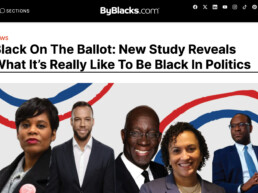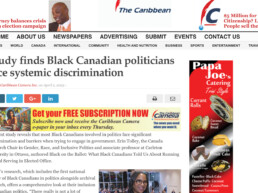Over the past two decades, more than 350 Black Canadians have run for elected office. Where is the comprehensive list of these changemakers?
BY ERIN TOLLEY + VELMA MORGAN
Every February during Black History Month, Canadian schoolchildren learn about Black people who have changed the world: Harriet Tubman, Jackie Robinson, Martin Luther King, Jr., Oprah Winfrey. With perhaps the notable exception of Viola Desmond — the face of our $10 bill — Black Canadians are usually conspicuously absent from this list. That needs to change, and politics is a good place to start.
Black Canadians have blazed trails in Canadian politics. For instance:
- Abraham Shadd, a shoemaker, abolitionist and conductor on the Underground Railroad: in 1859, he became the first Black man elected to public office in Canada;
- Lincoln Alexander, a wireless operator in the Royal Canadian Air Force during the Second World War, then a lawyer, MP, cabinet minister and lieutenant governor, the first Black Canadian in each of those positions;
- Rosemary Brown, a social worker, advocate for gender equality and member of the B.C. legislature and the first Black woman to run for party leadership in Canada.
These and other Black Canadians helped break down barriers, pushing for the end of discriminatory laws and helping create electoral institutions that inch Canada closer to equality. A history lesson that overlooks these achievements denies them.
Instead of celebrating our own heroes, we exalt those of our American neighbours while simultaneously looking smugly down at their troubled race relations, impervious to the erasure of our own racial history.
Over the past two decades, more than 350 Black Canadians have run for elected office. But you won’t find a comprehensive list of these changemakers anywhere. In our work, it was the dogged determination of Taryn Rerrie, an enterprising university student, who helped us come up with a list of Black Canadian politicians and office-seekers. It shouldn’t be like this.
The Library of Parliament maintains a comprehensive database of information on parliamentarians. It tells you which MPs are women, have military experience, or died in office. But it has no information on racial diversity and no list of Black parliamentarians. In part, this absence reflects the difficulty of collecting racially disaggregated data, but it isn’t an absolution.
In 2017, the United Nations Committee on the Elimination of Racial Discrimination highlighted Canada’s failure to systematically collect racially disaggregated data on social and economic outcomes. The federal government’s anti-racism strategy, released in 2019, committed to the collection of more racial data, but to-date those efforts have focused on federal workplaces and the compilation of population data and have not yet been taken up by parliamentarians in their own workplace.
Management experts note “what’s measured is what matters.” When institutions don’t collect racial data, they can claim race doesn’t matter. In politics, this is not the case: plenty of research has demonstrated racial differences in candidate evaluations, nomination and recruitment, campaign contributions and media coverage. However, Parliament and legislatures have been slow to collect and compile data on race.
Here, it would be useful to look to our American neighbours. The U.S. House of Representatives provides detailed information on Black Americans in Congress; so does the Senate.
In Canada, we rely on academic researchers, non-profits and journalists who pull together these statistics after every electoral cycle. Those efforts are vital, but piecemeal and precarious. They are fuelled by goodwill rather than a concerted institutional commitment to understanding how race influences politics.
Black History Month is about celebrating Black peoples’ contributions. To do that, they must be made visible. One part of these efforts is the first ever national survey of Black Canadian candidates, currently ongoing, led by Operation Black Vote Canada and Carleton University. The final results will shed light on Black Canadians’ pathways into politics, and their experiences when they get there. They will help us pinpoint gaps, devise solutions, and track progress over time. This will lead to more effective representation.
When we have better data on race-based outcomes, we get better outcomes, and that is something worth celebrating.
Management experts note “what’s measured is what matters.” When institutions don’t collect racial data, they can claim race doesn’t matter. In politics, this is not the case: plenty of research has demonstrated racial differences in candidate evaluations, nomination and recruitment, campaign contributions and media coverage.
Related reading
Study finds Black Canadian politicians face systemic discrimination
The Caribbean Camera Inc.
April 2, 2025


